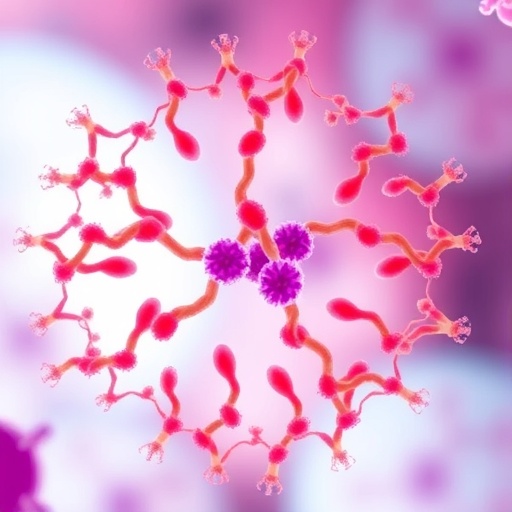In a groundbreaking study published in Cancer Cell, researchers from The University of Texas MD Anderson Cancer Center have unraveled a previously elusive mechanism by which bacteria residing within tumors confer resistance to chemotherapy in patients with oral and colorectal cancers. This discovery reveals a new facet of tumor biology, emphasizing the profound influence that the microbiota can exert on cancer progression and treatment outcomes. By illuminating the intricate interactions between microbes and cancer epithelial cells, the study opens the door to novel microbe-targeted therapeutic strategies aimed at overcoming treatment resistance.
Despite growing awareness that microbes inhabit tumor microenvironments, the precise role and impact of these bacteria remained largely speculative until now. The MD Anderson team focused on Fusobacterium nucleatum (Fn), a bacterium frequently enriched within certain tumor niches. Their investigations demonstrated that Fn orchestrates a remarkable phenomenon: it induces cancer cells into a reversible state known as quiescence, wherein the cells temporarily exit the active cell cycle. This resting phase allows cancer cells to effectively evade immune surveillance and resist the cytotoxic effects of chemotherapies, which predominantly target proliferating cells.
The underlying mechanisms involve Fn physically infiltrating tumor masses and positioning itself in the intercellular spaces between epithelial cancer cells. This strategic localization disrupts normal cell-to-cell communication and signaling pathways essential for immune detection and cellular metabolism. By inducing quiescence, Fn essentially “masks” cancer cells from immune effector cells such as cytotoxic T lymphocytes while simultaneously safeguarding them from chemotherapeutic agents, which generally rely on cells being in active division phases to exert their full efficacy.
This novel insight arose from spatial transcriptomic and histological analyses that revealed an inverse relationship between Fusobacterium abundance and epithelial cell density and transcriptional activity within tumor regions. Specifically, areas enriched with Fn exhibited diminished gene expression profiles related to immune response and cellular proliferation. These findings were corroborated through sophisticated preclinical models, which faithfully recapitulated the microbe-tumor interplay, demonstrating Fn’s capacity to accumulate selectively within hypoxic tumor niches and impair chemotherapeutic sensitivity.
To validate these discoveries in a clinical context, the researchers performed spatial analyses on tumor biopsies from a cohort of 52 patients diagnosed with colorectal and oral cancers. The data indicated a consistent pattern: patients with higher intra-tumoral Fusobacterium loads exhibited suppressed immune gene signatures and poorer responses to chemotherapy regimens. This clinical correlation underscores the potential of Fn as both a biomarker of treatment resistance and a therapeutic target.
The implications of these findings resonate profoundly within the oncology and microbiology communities. Dr. Susan Bullman, the study’s lead author, emphasizes the transformative nature of revealing microbial contributions to cancer cell behavior: “These bacteria-tumor interactions have been hiding in plain sight. With cutting-edge technologies, we can finally delineate how microbes modulate tumor biology, influencing disease progression and therapeutic outcomes.” By integrating microbial dynamics into the conventional landscape of tumor biology, this research paves the way for a paradigm shift toward “microbe-aware” cancer treatments.
Understanding the nuanced role of Fusobacterium and similar bacteria in tumor microenvironments presents opportunities to conceptualize precision therapies that disrupt these protective microbial niches. Potential strategies include developing antimicrobial agents capable of selectively eradicating tumor-harboring bacteria without disrupting the host’s beneficial microbiota or engineering bacteriophages targeted against specific oncogenic microbes. Additionally, the study highlights efforts underway at MD Anderson to leverage synthetic biology techniques, harnessing engineered tumor-targeting bacteria as novel “bugs as drugs” to penetrate solid tumor barriers and deliver therapeutic payloads more effectively.
Nonetheless, the authors acknowledge inherent limitations in the experimental models utilized. Laboratory conditions, including bacterial inoculum concentrations and oxygen tension, may not perfectly mimic the dynamic and heterogeneous microenvironments encountered in human tumors. Consequently, extrapolating these findings demands caution and underscores the necessity for further in vivo analyses and clinical validation to fully characterize the functional relevance and therapeutic exploitability of microbial-tumor interactions.
In conclusion, this seminal work sheds light on the heretofore underappreciated role of the tumor microbiota in mediating treatment resistance through induction of cancer cell quiescence. By unveiling Fusobacterium nucleatum as a critical architect of tumor evasion mechanisms, the study not only enhances our molecular understanding of cancer biology but also identifies promising avenues for therapeutic intervention. The future of oncology may well involve a dual focus on targeting neoplastic cells alongside their microbial accomplices, heralding an era of integrative cancer treatment paradigms.
Subject of Research: Microbial influence on treatment resistance in oral and colorectal cancers
Article Title: Fusobacterium nucleatum Drives Cancer Cell Quiescence and Chemotherapy Resistance in Oral and Colorectal Tumors
News Publication Date: October 16, 2025
Web References:
MD Anderson Cancer Center
Cancer Cell Article
Colorectal Cancer at MD Anderson
Susan Bullman Profile
MD Anderson Immunology Department
James P. Allison Institute
“Bugs as Drugs” Microbial Cell Therapy
References:
Bullman, S., et al. (2025). Fusobacterium nucleatum induces cancer cell quiescence and drug resistance. Cancer Cell. DOI: 10.1016/j.ccell.2025.04.015.
Image Credits: The University of Texas MD Anderson Cancer Center
Keywords: Gut microbiota, Fusobacterium nucleatum, tumor microbiome, cancer quiescence, chemotherapy resistance, colorectal cancer, oral cancer, tumor immune evasion, microbial oncology, synthetic biology, microbial therapeutics
Tags: bacterial influence on tumor biologycancer microenvironment and bacteriaFusobacterium nucleatum and cancerimpact of tumor-associated bacteria on treatment outcomesmicrobe-targeted cancer therapiesmicrobiota interactions with cancer cellsnovel therapeutic strategies for cancer resistanceoral and colorectal cancer treatment challengesquiescence in cancer cells and immune evasionrole of bacteria in chemotherapy resistancetumor microbiota and cancer treatment resistanceunderstanding bacteria in cancer progression





